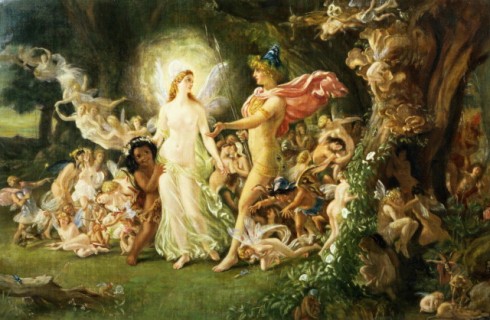February 18, 2010
Oberon, King of the Faeries
Oberon is best known from Shakespeare’s
Midsummer Night’s Dream,
the king of the faeries who interferes with the love lives of mortals,
and plays tug-of-war with Titania over trinkets and toys (read: people)
they both want. Oberon was most likely taken from a legend of a
Merovingian
sorcerer named Alberich, or “elf-ruler,” who was believed to be the
other-worldly brother of Merowich, whom the people got their name from.
The name Oberon first showed up in a French heroic song, about a
fairy who was cursed to a dwarfish height by an offended fairy at his
birth (hello, Sleeping Beauty?) but was given great beauty in
consolation. In the poem, Oberon aids the hero in winning a pardon for
killing the emperor’s son in self-defense, after performing various
feats. This poem was based on bits and pieces of fact of a true hero
who lived in the ninth century, but was understandably embellished. In
it, Oberon had a magical cup, which has been compared to the Holy Grail,
which was always full for the virtuous.
In
Midsummer Night’s Dream, Oberon wants to a human child
that Titania’s taken into her care—it’s the child of a mortal friend of
hers who’d died, and she wants to raise it for her friend, but Oberon
wants to have the child for his own purposes, to raise as a henchman,
basically. To distract her, he uses a magical ointment that he has put
into her eyes, so that she falls in love with a man who’s been given a
donkey’s head—meanwhile he has his servant
Puck
meddle with two pairs of lovers that are wandering in the woods, with a
mistake or two made along the way. Eventually he feels badly for what
he’s done to his Titania, though, and the two are reunited.
Given the title of King of the Faeries, Oberon is understandably
mentioned here and there in other works of fiction, of a more
contemporary nature. As a few examples, he’s mentioned briefly both in
Susanna Clarke’s
Jonathan Strange and Mr. Norrell, and also in Frewin Jones’
Faerie Path novels.
eron is best-known as a character in Shakespeare's comedy A Midsummer Night's Dream. In it he is the king of the fairies, and the husband of Titania.
The origins of Oberon, though, lie not in
folklore, but in John Bourchier, Lord Berners' translation of the 13th
century French romance, Huon of Bordeaux, into English in 1534.
In it Oberon is a fairy king who lives in a
wood that is full of strange and magical things. He is only three feet
tall, and is deformed, with a crooked shoulder, yet with a face so
handsome that no mortal man can remain unmoved by his beauty. Oberon
wears a gown studded with precious stones, so bright that it shines like
the sun. He carries a magic bow that can kill any animal he aims his
arrows at, and a magic horn that can cure sickness and hunger when it is
blown.
Oberon speaks to all who enter his wood, and
anyone to whom he speaks is lost for ever. Those who remain silent and
do not speak to Oberon are beset by terrible storms.
Oberon turns out to be the son of Julius
Caesar and a lady of the Secret Isle. All the fairies were invited to
celebrate his birth, except one. The excluded fairy was so angry, that
she cursed the baby; her curse made him stop growing when he was three
years old. Later, relenting, she gave him great beauty. In a manner
similar to the story of Sleeping Beauty, the other fairy guests gave him
many magical gifts: clairvoyance, the ability to go wherever he wants
to by wishing, the power to tame any creature, the power to make a
castle grow at his command, to never age or look old, and when he leaves
this world, to go straight to Paradise.
From Huon of Bordeaux, Robert Greene introduced Oberon into his play, James IV (1594). In this Oberon is again the fairy king, and very small, as are all the fairies.
It is possible that Berners' translation, and Greene's play influenced Shakespeare in his creation of Oberon the fairy king in
A Midsummer Night's Dream.
Oberon was used in several later works as
well, including a masque by Ben Johnson for Prince Henry, James I's
heir, and in Michael Drayton's poem Nymphidia (1627). He also appears in Carl Maria von Weber's opera Oberon, or the Elf King's Oath, an adaptation of Shakespeare's
A Midsummer Night's Dream. The opera was first performed in 1826, at Covent Garden, London.


Δεν υπάρχουν σχόλια:
Δημοσίευση σχολίου